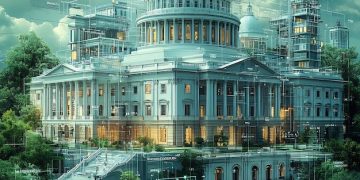Immigration Reform Debates: Current Issues and Proposed Solutions

What are the current debates surrounding immigration reform, and what are the proposed solutions? These debates center on border security, pathways to citizenship, and economic impacts, with proposed solutions including enhanced technology, comprehensive reform bills, and targeted enforcement measures.
Immigration reform remains a contentious issue in the United States, sparking intense debate across the political spectrum. What are the current debates surrounding immigration reform, and what are the proposed solutions? Understanding these debates is crucial for informed civic engagement and shaping effective policy.
This article will delve into the core arguments and potential resolutions surrounding what are the current debates surrounding immigration reform, and what are the proposed solutions, offering a comprehensive overview of this complex issue.
Understanding the Core of Immigration Reform Debates
The debate surrounding immigration reform is multifaceted, encompassing economic, social, and ethical considerations. Key issues include border security, the status of undocumented immigrants, and the impact of immigration on the U.S. workforce.
Stakeholders often hold conflicting views, making consensus difficult to achieve. Let’s dive deeper into the specific areas of contention.
Border Security Concerns
A primary concern in the immigration debate is border security. Proponents of stricter measures argue that a secure border is essential for national security and to prevent illegal immigration.
Concerns about border security often involve arguments related to national security, drug trafficking, and human smuggling.
- Enhanced technology, such as drones and sensors, to monitor border activity.
- Increased personnel, including Border Patrol agents and support staff.
- Construction of physical barriers, such as walls and fences.

Pathways to Citizenship: A Contentious Issue
Another major debate revolves around providing pathways to citizenship for undocumented immigrants already living in the U.S. There’s a lot of discord about the best route to take moving forward with this.
This debate often focuses on whether undocumented immigrants should be given the opportunity to become citizens, and under what conditions.
Economic Impact and The Labor Force
The economic impact of immigration is a complex and often disputed topic. Some argue that immigrants fill essential labor needs and contribute to economic growth, while others express concern about wage depression and job displacement for native-born workers. What are the current debates surrounding immigration reform, and what are the proposed solutions in relation to these economic concerns?
This is a crucial area of discussion, with various perspectives on how immigration affects different sectors of the economy.
In conclusion, understanding these core debates is vital for comprehending the complexities of immigration reform and evaluating potential solutions.
Proposed Solutions: Addressing the Immigration Challenge
Numerous solutions have been proposed to address the challenges within the immigration system. These range from legislative reforms to technological enhancements and increased enforcement efforts.
Finding common ground among these diverse solutions remains a significant hurdle, but exploring these options is essential for progress.
Legislative Reform: A Comprehensive Approach
Comprehensive immigration reform bills often aim to address multiple aspects of the issue, including border security, pathways to citizenship, and enforcement. These bills seek to provide a holistic solution to the immigration challenge.
The push for comprehensive legislative reform reflects a desire for a more systemic and sustainable approach to immigration.
- The DREAM Act, which would provide a pathway to citizenship for undocumented immigrants brought to the U.S. as children.
- Border security enhancements, including funding for technology and personnel.
- Visa reform to address workforce needs in various sectors.
Technological Solutions: Enhancing Border Security
Advocates of technological solutions argue that advanced technology can improve border security and streamline immigration processes. What are the current debates surrounding immigration reform, and what are the proposed solutions involving technological approaches?
The emphasis on technology reflects a desire for more efficient and less resource-intensive methods of border control.
Enforcement Measures: Balancing Security and Human Rights
Increased enforcement measures, such as workplace audits and deportations, are often proposed as a way to deter illegal immigration. These measures are intended to reinforce existing immigration laws. Finding the right balance is key.
Enforcement also includes measures to combat human trafficking and other criminal activities related to immigration.

Proposed solutions to the immigration challenge involve a range of strategies, from legislative reforms to technological advancements and enforcement measures. Each approach has its proponents and critics, highlighting the complexity of finding a universally accepted solution.
The Role of Public Opinion and Political Polarization
Public opinion and political polarization significantly influence the immigration debate. Diverging views on immigration policy often reflect broader ideological differences and partisan allegiances.
Understanding these dynamics is crucial for navigating the often-contentious landscape of immigration reform.
Public Perception of Immigration
Public perception of immigration varies widely, influenced by factors such as economic conditions, cultural values, and media coverage. These perceptions can shape political attitudes and influence policy decisions. What are the current debates surrounding immigration reform, and what are the proposed solutions that resonate with different segments of the public?
Surveys and polls often reveal contrasting views on immigration, reflecting the diverse perspectives within the U.S.
- Economic impact, with some believing immigrants boost the economy and others fearing job displacement.
- Cultural integration, with concerns about assimilation and the preservation of national identity.
- Security concerns, particularly in the context of terrorism and border security.
Political Polarization of Immigration Policy
Immigration policy has become increasingly polarized, with Democrats and Republicans often holding sharply contrasting views. This polarization can hinder legislative progress and make it difficult to find common ground.
The political divide on immigration reflects fundamental differences in ideologies and priorities.
In summary, public opinion and political polarization play a significant role in shaping the immigration debate and influencing policy outcomes. Bridging these divides requires open dialogue and a willingness to compromise.
Economic Factors: Impacts on Wages and Employment
The economic impact of immigration is a central theme in the debate, with discussions focusing on wages, employment, and economic growth. Understanding these economic factors is essential for informed policymaking.
Economists hold diverse views on the net economic effects of immigration, contributing to the complexity of the debate.
Impact on Wages for Low-Skilled Workers
One concern is the potential impact of immigration on wages for low-skilled workers. Some studies suggest that increased immigration can depress wages in certain sectors, while others find minimal effects.
This issue often sparks debate about the need for wage protections and policies to support low-skilled workers.
Immigration and Job Creation
Another area of discussion is the relationship between immigration and job creation. Some argue that immigrants create jobs through entrepreneurship and consumption, while others worry about job displacement. What are the current debates surrounding immigration reform, and what are the proposed solutions aimed at maximizing the positive economic effects of immigration?
The impact on job creation often depends on the skills and industries in which immigrants work.
In conclusion, economic factors play a critical role in the immigration debate, with both positive and negative impacts being cited by various stakeholders. A balanced assessment of these economic effects is essential for developing effective immigration policies.
Ethical and Humanitarian Considerations: Balancing Compassion and Security
The immigration debate also involves ethical and humanitarian considerations, such as the treatment of asylum seekers and the rights of children. Balancing compassion with security concerns is a key challenge.
Ethical considerations often involve questions of fairness, justice, and human dignity.
The Plight of Asylum Seekers
The treatment of asylum seekers is a major ethical concern. Many asylum seekers face difficult conditions, including detention and separation from their families. Balancing border security with humanitarian obligations is a challenge.
International law and human rights norms often guide discussions about asylum policy.
Children and Immigration Policy
The impact of immigration policies on children is another ethical consideration. Separating children from their parents and detaining children raise significant concerns. What are the current debates surrounding immigration reform, and what are the proposed solutions that prioritize the well-being of children?
Advocates for children’s rights often call for policies that protect vulnerable children and ensure their access to education and healthcare.
In summary, ethical and humanitarian considerations are integral to the immigration debate. Policymakers must strive to balance compassion with security concerns, ensuring that immigration policies respect human rights and uphold ethical principles.
| Key Point | Brief Description |
|---|---|
| 🔒 Border Security | Debates over technology and personnel for enhanced security. |
| 🛂 Citizenship Paths | Discussions on providing pathways for undocumented immigrants. |
| 📈 Economic Impact | Analysis of effects on wages, jobs, and economic growth. |
| ❤️ Ethical Concerns | Balancing compassion with security regarding asylum seekers. |
Frequently Asked Questions About Immigration Reform
The main goals often include enhancing border security, providing pathways to citizenship, and addressing economic impacts. These goals seek to create a more efficient and equitable immigration system.
Immigration can affect the economy in various ways, including filling labor needs, boosting economic growth, and potentially impacting wages. Economists hold diverse views on the net economic effects.
Proposed solutions range from enhanced technology and increased personnel to physical barriers. These measures aim to prevent illegal immigration and strengthen national security.
The DREAM Act is legislation that would provide a pathway to citizenship for undocumented immigrants brought to the U.S. as children. It would benefit young people who have grown up in the U.S.
Ethical considerations include the treatment of asylum seekers, the rights of children, and the balancing of compassion with security concerns. These considerations often involve questions of fairness and human dignity.
Conclusion
The debates surrounding what are the current debates surrounding immigration reform, and what are the proposed solutions are complex and multifaceted, touching on economic, ethical, and social considerations. Understanding these issues is crucial for informed civic engagement and effective policymaking.
Finding common ground and developing sustainable solutions requires open dialogue, a willingness to compromise, and a commitment to balancing compassion with security concerns. The future of immigration policy in the U.S. depends on addressing these debates thoughtfully and collaboratively.





